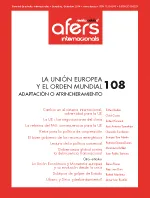After Kyoto, Beijing: the EU and the new climate negotiations

The article evaluates how the transition of power underway in the international system has changed international climate negotiations, as well as the way the EU has responded to this process. More specifically, and, in line with the introductory article of this edition, it is argued that, until 2005-2007, negotiations took place within a structure of normative congruence, characterised by climate institutions being set up in spite of the reluctance of a very powerful coalition of states. However, since mid-way through the first decade of the 2000s, the negotiations have entered a phase of institutional lag and the new coalition of key actors (made up of the United States and emerging countries) are imposing a new conceptual approach that has left the old institutions clearly lagging behind. The EU has responded to this change by adjusting its strategies and objectives.
Key words: European Union, climate change, international system, negotiations
>> The full text articles of this issue are available only in Spanish language